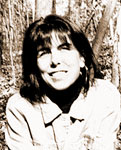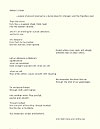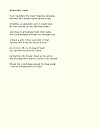PIVOT POINTS | Third
Generation Poet
Laura-Gray Street
The web of relations starts for me with Buffy
[Elizabeth Seydel] Morgan, whom I have known all my life and who
has been, in my poetic development, the most long-standing role
model,
mentor,
and friend.
Through Buffy I started learning from Dave Smith long before I
sat in his workshops and lectures at Warren Wilson. From Dave I
learned to ask the really hard questions of my work, to ask a poem "Why?" and "So
what?"
I also had the incredible fortune at Warren
Wilson to work with Larry Levis. Once I had to deliver my work
to his house. I remember driving through Church Hill, half-intentionally
lost and writing to him later how I wanted that range of textures
in my poems: brass historical plaques; parks; concrete; saw dust
and street grit; the young woman crossing 27th, gold hoops in her
ears, cigarette dangling from the arm cocked out at her hip; the
condemned property with windows blown-out, vacant and its front
door slack-jawed, off the hinges. It is the kind of heterogeneity
I find in Larry's work. A kind of biodiversity.
Rereading Larry's letters from the spring of
1996 when he was my supervisor is, for obvious reasons, painful.
I was waiting for his response to my fourth of six packets when
I received news that he had died. Painful too because it resurrects
a hard time in my life, which sums up in a word: divorce. Linked
as they are in time, I cannot separate the two experiences, those
two deaths, and so I can't talk about his influence without putting
it into that context. The poem "Disposable Goods" in
this exhibit is one I was working on (in embryonic form) during
that semester with Larry; it was a poem he encouraged particularly.
In my first letter to him I mentioned a comment a visiting writer
had made in a poetry class at Randolph-Macon Woman's College, that "Every
poet needs a certain amount of self-hatred." The assertion
appealed to me then, but Larry had this to say: "It may be
true. Certainly some great artists, Michaelangelo, Caravaggio made
great art and also had a degree of contempt for themselves. But
the reasons for this are complicated. Caravaggio was angry, impulsive,
and he killed a man. His later portrait of Goliath's severed head,
held by David, is a self-portrait. Michaelangelo's self depiction
is similarly diminishing: a young man holds him down with a foot
on the chest of the then old, dying artist. He also hated painting,
and, possibly, a system of patronage that compromised him, one
in which the Pope could rent him to put something on the ceiling
of a chapel. If self-hatred is necessary, I think forgiving ourselves
is just as necessary, especially in difficult times, though it
is harder to do."
The German naturalist, Ernst Haeckel,
who originated the term, "ecology" in 1866, needed
a word to describe a new science that studied the relations between
organisms and environments: the study of ecosystems. In many
ways, Pivot Points strikes me as just that, an ecologic study,
a portrait of two ecosystems. I have become increasingly fascinated
with the idea that language itself is a kind of ecosystem, and
increasingly convinced that this idea is not simply a fanciful
metaphor. As poet Matthew Cooperman writes, "A poem is an
ideal habitat for words." I try to teach this to my students,
and, if I am successful, it is because a network of teachers
showed me rigorous, forgiving ways to give words a home. 
| |
|
|
|
|
|
 |
 |
 |
 |
 |
 |
Commentary
 |
Potters'
Field
 |
|
Disposable
Goods
 |
|
Materiales
Desechables
 |
 |